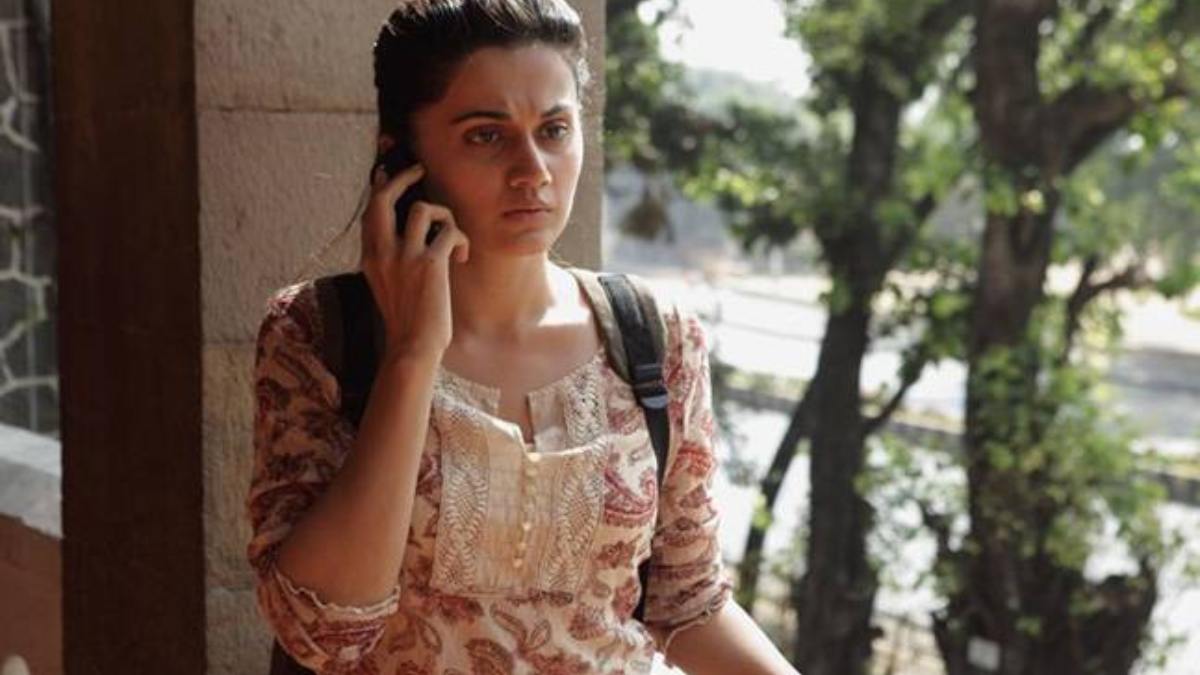It seems pretty ominous in hindsight that the turning point in Taapsee Pannu’s career was a film called Naam Shabana. It is not every day that an actress gets to be named after the finest living dramatic actress of the country. Taapsee managed to wrap her head around her character’s flaws and make them seem like human traits that we need to conquer to achieve a level of success beyond the prescribed. After Pink, Taapsee was again in startling form as Shabana Khan, an ordinary girl with extraordinary resilience who, when pushed into a corner, hits back. Hits back really hard.
The thing about Taapsee is, she is never caught acting. I could only see this steel-willed, imperturbable, spunky girl on screen. Shabana is seen to live in a crowded Muslim locality of Delhi, shot by cameraman Sudhir Palsane with rigorous authenticity. As Shabana strides across the screen with a confidence that comes from a place opposite to emotional/economic security, we sometimes catch passersby staring at her. This could be gawkers looking at Taapsee. Or Shabana’s neighbours watching her in admiration.
Naam Shabana takes the risk of exposing itself to crowds. A lot of the gripping narrative unfolds on crowded streets. Director Shivum Nair cuts the scenes in motions of anguished urgency, where we at once sense the protagonist’s need to avenge the wrongs done to her in the past and in the immediate here-and-now.
Naam Shabana constantly runs on two levels. The backstory to the espionage drama is bolstered by the heroine’s constant wrestle with her conscience. Shabana wants to let us into her feelings. But the minute we accept her invitation, she clams up. Taapsee plays this introvert with a compelling combination of reticence and transparency.
It is a remarkable performance. But then, this is a remarkable film. The two halves of the narrative are almost like two different films, both equally irresistible but constructed under differing circumstances. The first half is devoted to building a relationship for the loner heroine with a boy (Taher Mithaiwala) who won’t take no for an answer, and then dismantling her hope for love. The second half constructs a brisk, bracing spy thriller with Malayalam star Prithviraj pitching in a gritty, menacing turn as a nasty international villain. It is here that the action explodes on the screen with optimum impact.
It all comes together in ways that are both unexpected and satisfying, with Manoj Bajpai playing the mouthpiece of a faceless governmental organization that recruits spunky, fearless youngsters to fight battles that cannot be fought legally. I wish the scenes featuring Bajpai and Pannu were fleshed out with more fury and less sardonicism. In what could possibly be the most revealing dialogue on the Islamic identity in times of terrorism, Bajpai explains to Taapsee’s Shabana Khan how her Muslim identity can be helpful in infiltrating restricted areas of counter-constitutional activity.
The scenes are cleverly written, and Akshay Kumar’s extended cameo is a sure-shot crowd-pleaser. The film also has some savagely funny moments. At one point, when that very fine actor Zakir Hussain is spying on a bikini-clad woman while holding back his urge to pee, he exclaims his organ has grown “confused.”
Providentially, Naam Shabana, for all its intricate twists and turns, remains almost entirely bereft of any confusion. It is a lucid and tightly wound piece of cinema with a central performance that is pitch-perfect and freed of gimmicky shots at militant feminism. I wish director Shivum Nair, who reveals such an explosive flair for fusing personal and political statements, would have avoided the club songs that come on at points where we can almost hear the makers telling one another, “Yahan pe thoda relief daal do.”
But there is no need. Naam Shabana is a film of rude awakening, reminding us how much maturity in vision, treatment, execution, and performances a film can achieve provided it stops looking for reasons to make audiences happy. Watching this film is a joy, although nothing really happy happens to Shabana. We are just happy that she can fight her own battles even when the odds are stacked sky-high against her.
Taapsee had to undergo rigorous training in action to get her character right in Baby, and she worked twice as hard on the stunts in Naam Shabana. Says Taapsee, “A lot of people felt my character in Baby had potential for development. While my character was taken from Baby, Naam Shabana was neither a prequel nor a sequel. It was part of the Baby franchise, but it was an independent film even while the character was derivative. Looking back, I am proud of Naam Shabana. It came before all the other films about what you call the Shero. The stunts were tough. But what is life without challenges? And Akshay Sir was so sporting, putting in a cameo for the sake of the franchise. Yeah, I’d love to do another film in the series.”












